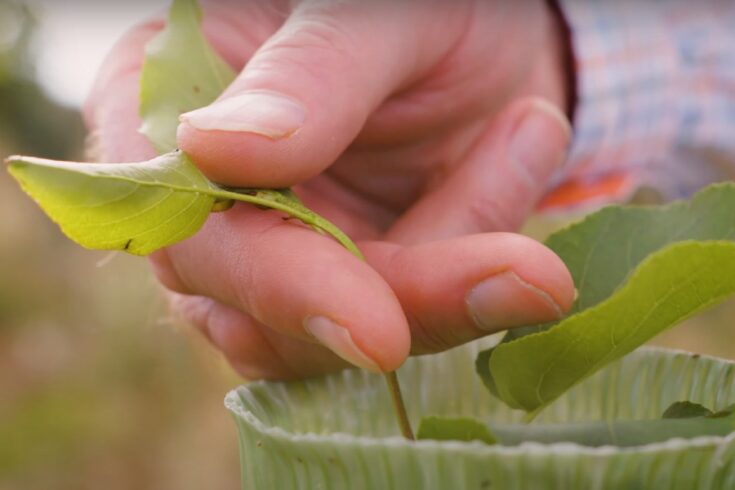Lignin is a tough structural material from plants. It’s a waste product of paper manufacturing and is usually burned as fuel. A team of researchers led by the University of Warwick and Biome Bioplastics Ltd have developed a biological method to extract valuable chemicals from lignin and turn them into eco-friendly bioplastic.
Video credit: Biome Bioplastics.
On-screen captions and an autogenerated transcript are available on YouTube.
About the project
Professor Tim Bugg at the University of Warwick began studying lignin degradation using a BBSRC Integrating Biorefining Research and Technology (IBTI) Club grant.
His team identified bacteria such as Rhodococcus jostii which could break down lignin. They experimented with using enzymes from the bacteria to break down lignin into useful products. One such product was vanillin, which is valuable to the food and flavouring industry, but already successfully produced using chemical methods.
High quality biodegradable plastics from lignin
Professor Bugg found the gap in the market he needed when he was approached by Paul Law, Managing Director of Biome Bioplastics. Law was interested in making bioplastics from pyridine dicarboxylic acids (PDCAs) due to their potential to build high quality, biodegradable bioplastics.
“They were interested in aromatic dicarboxylic acids because having more aromatic content in plastic gives it better thermal properties,” says Bugg. “That led them to lignin as a raw material.” In 2013 they won funding from Innovate UK to demonstrate the commercial feasibility of producing PDCAs, and therefore bioplastics, from lignin.
Bugg and collaborators at the University of Leeds and the Centre for Process Innovation (CPI) began engineering Rhodococcus jostii to break down lignin into PDCAs. They used Industrial Biotechnology (IB) Catalyst funding, a joint initiative from BBSRC, EPSRC and Innovate UK.
“Our role was to use metabolic engineering to enhance the PDCA yield because the challenge is to get to a point where Biome could commercialise this,” explains Bugg. “It has proved quite challenging, but we are making progress.”
Bio-based, biodegradable and compostable materials
Plastic production is one of the UK’s biggest industries. It turns over more than £20 billion and exports more than £8 billion of plastic products each year. The UK has a world-leading engineering biology sector and its government aims to eliminate avoidable plastic waste by the end of 2042. All this means there are big opportunities in the UK for the bioplastics industry to redefine plastic production.
The charity WRAP estimates that 59% of UK plastic is used for packaging, such as trays and films. Their single-use nature makes these a clear product target for bioplastics companies such as Biome Bioplastics.
The term bioplastic refers to plastic made from renewable materials, such as plant biomass, but Biome Bioplastics intends to create bioplastics that are just as eco-friendly at the end of their life. “It’s important to us that the materials we’re developing have both a nice beginning of life story and end of life story,” says Krisztina Kovacs-Schreiner, Project and Business Development Manager at Biome Bioplastics. “So they’re bio-based and sustainable but also biodegradable and compostable because that’s how we close the circle.”
Kovacs-Schreiner is also clear that their products need to perform as well as oil-based plastics during their usable life to make them competitive against existing products. “The materials need to be functional and high performance, and we think that aromatic molecules [such as PDCAs] are the key to addressing this challenge,” she says. Biome Bioplastics plans to use their lignin-derived bioplastics to provide a green alternative to single-use plastics, starting with films for food packaging and moving onto cups, trays and coffee pods.
Biorefining lignin instead of burning it
Tough, heavily treated and resistant to degradation, waste lignin from the paper pulp industry is challenging to turn into useful products without using harsh chemicals. Leftover lignin is usually burned as fuel by the paper pulping plant, otherwise it can cause environmental pollution if discarded.
This means Biome Bioplastics has an opportunity to reduce pollution at both ends of their production process by turning a waste product into something useful and eco-friendly. “Lignin has evolved to be very tough to break down. It is inert, and there are not many lignin-degrading bacteria in soil,” says Bugg. Kovacs-Schreiner adds that lignin on its own would not break down: “Especially treated lignin from the paper pulping industry, which has gone through very harsh treatments. It would take thousands of years.”
Impacts of the project
Bugg’s team are continuing their metabolic engineering work with Biome Bioplastics with support from the BBSRC Networks in Industrial Biotechnology and Bioenergy (NIBB). These collaborative networks are also supported by EPSRC.
Bugg believes collaborative projects, such as his own with Biome Bioplastics and others funded through the BBSRC NIBB, are key to building the UK’s bio-based chemicals industry. “I appreciate the support I’ve had from BBSRC and their focus on industrial biotechnology as a priority area,” he says. “I think there is opportunity for a new biotech sector in biobased chemicals in the UK, and these kinds of projects are the way to do it.”
The collaboration has been a success, with commercial bio-based materials now being produced by Biome Bioplastics using chemicals extracted from lignin. Biome Bioplastics has produced biodegradable tree shelters that will reduce the amount of microplastics in soil. The tree shelters are now undergoing commercial testing, with support from Innovate UK, and could save an estimated 2,500 tonnes of plastic every year.
Find out more
Read the feasibility study ‘Evaluation of a novel process to obtain a high value polyester intermediate from lignin’ on Gateway to Research.
Read the profile of Tim Bugg, Professor of Biological Chemistry on the University of Warwick website.
Visit the Biome Bioplastics website and read their Exploration of Lignin (PDF).
Visit the Biomass Biorefinery Network (BBNet), which aims to develop new and improved processes for the conversion of non-food biomass into sustainable fuels, chemicals and materials.
Top image: Protection without microplastics damage - Biome Bioplastics are testing how their biodegradable tree shelters perform and eventually degrade. Credit: Biome Bioplastics Ltd.

